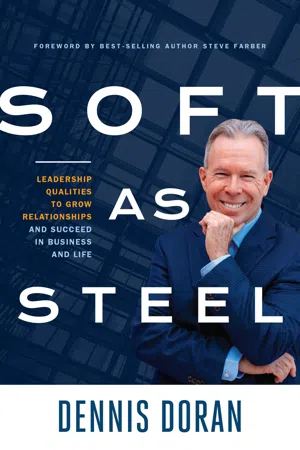
eBook - ePub
Soft as Steel
Leadership Qualities to Grow Relationships and Succeed in Business and Life
Dennis Doran
This is a test
- English
- ePUB (apto para móviles)
- Disponible en iOS y Android
eBook - ePub
Soft as Steel
Leadership Qualities to Grow Relationships and Succeed in Business and Life
Dennis Doran
Detalles del libro
Vista previa del libro
Índice
Citas
Información del libro
The landscape of the construction industry is changing rapidly.
Success is no longer driven by a single generation, technology, or bidding strategy. In today’s diverse industry, your ability to adapt and grow hinges on soft skills.
In Soft as Steel, Dennis Doran starts new conversations about bringing communication and introspection to a business where these essential skills traditionally go undervalued.
Within this book you will:
- learn to recognize soft skills and cultivate them in your day-to-day interactions.
- hear the value of soft skills from three generations with boots-on-the-ground perspectives.
- complete simple activities that leave you with a better understanding of yourself.
- use your existing strengths to leverage soft skills in your personal and professional life.
- find 50+ easy-to-read thoughts that connect soft skills to your day-to-day processes in a practical way.
Written to meet you where you are, Soft as Steel gives new leaders and career veterans alike the tools they need to not only evolve with the industry but to shape it as it grows.
Preguntas frecuentes
¿Cómo cancelo mi suscripción?
¿Cómo descargo los libros?
Por el momento, todos nuestros libros ePub adaptables a dispositivos móviles se pueden descargar a través de la aplicación. La mayor parte de nuestros PDF también se puede descargar y ya estamos trabajando para que el resto también sea descargable. Obtén más información aquí.
¿En qué se diferencian los planes de precios?
Ambos planes te permiten acceder por completo a la biblioteca y a todas las funciones de Perlego. Las únicas diferencias son el precio y el período de suscripción: con el plan anual ahorrarás en torno a un 30 % en comparación con 12 meses de un plan mensual.
¿Qué es Perlego?
Somos un servicio de suscripción de libros de texto en línea que te permite acceder a toda una biblioteca en línea por menos de lo que cuesta un libro al mes. Con más de un millón de libros sobre más de 1000 categorías, ¡tenemos todo lo que necesitas! Obtén más información aquí.
¿Perlego ofrece la función de texto a voz?
Busca el símbolo de lectura en voz alta en tu próximo libro para ver si puedes escucharlo. La herramienta de lectura en voz alta lee el texto en voz alta por ti, resaltando el texto a medida que se lee. Puedes pausarla, acelerarla y ralentizarla. Obtén más información aquí.
¿Es Soft as Steel un PDF/ePUB en línea?
Sí, puedes acceder a Soft as Steel de Dennis Doran en formato PDF o ePUB, así como a otros libros populares de Business y Construction Industry. Tenemos más de un millón de libros disponibles en nuestro catálogo para que explores.
Información

BUILDING
YOUR
FOUNDATION
YOUR
FOUNDATION
What Soft Skills Are Important to You?
Let’s begin building your foundation of understanding about soft skills with an activity that will take you about fifteen minutes to complete.
Before I talked with my conversation partners about soft skills, I asked them to complete a survey to learn the personality qualities they believe have been the most important in their working life’s journey. As you complete this exercise, your instruction is the same. Keep the work setting in mind as you complete it.
There are four groups of words on each of the next few pages. The words describe a person’s soft skills: their habits, qualities, and attributes.
If you are not sure of a word’s meaning, take a moment and google it. I do this often. :)
Please follow the instructions for each word group, one to four, in order. All you have to do is force rank each group of words.
After completing each group, proceed to “Your Final Ranking” and follow the instructions to determine your final list of the twelve qualities most important to you in your working career.
Do Your Own Ranking of Qualities
GROUP 1
GROUP 1
Please force rank these qualities from 1 to 10, with 1 being the most important to you and 10 being the least important to you. Simply enter the number in the box next to each word.
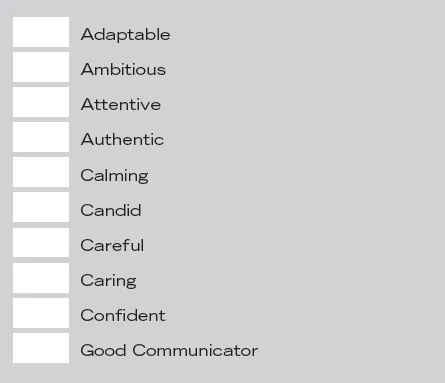
GROUP 2
Please force rank these qualities from 1 to 10 with 1 being the most important to you and 10 being the least important to you. Simply enter the number in the box next to each word.
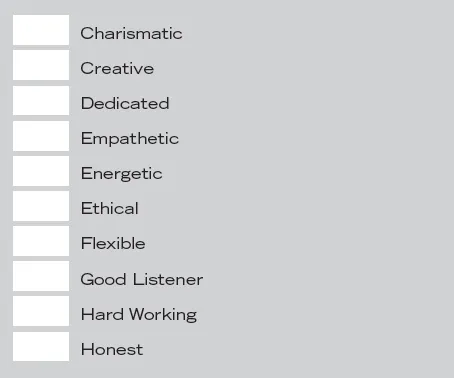
GROUP 3
Please force rank these qualities from 1 to 10 with 1 being the most important to you and 10 being the least important to you. Simply enter the number in the box next to each word.
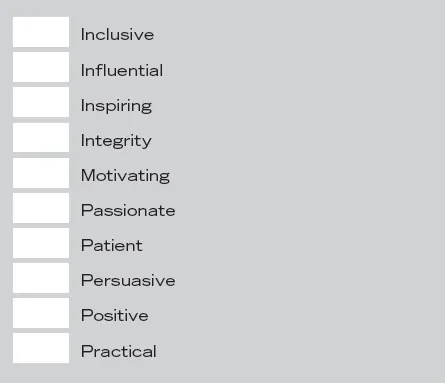
GROUP 4
Please force rank these qualities from 1 to 10 with 1 being the most important to you and 10 being the least important to you. Simply enter the number in the box next to each word.
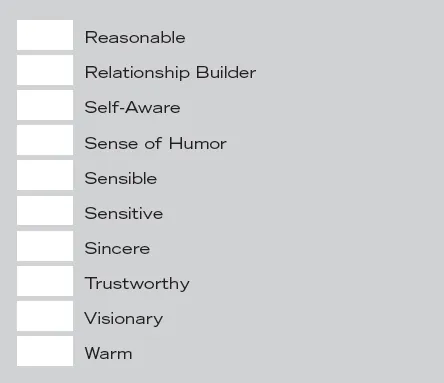
YOUR FINAL RANKING
Enter the qualities you ranked 1, 2, and 3 from Groups 1-4 in the righthand column.
Force rank these qualities from 1 to 12 with 1 being the most important to you and 12 being the least important.

I hope you find your results interesting. I think it will help you appreciate even more what this book is about, and you will come back to your results in Part 4.
What I Learned from the Conversations: Soft Skills and What They Are
Maybe it’s as simple as saying that soft skills are your personal qualities, traits, and characteristics, or maybe your personality. I don’t know about you, but these kinds of vague phrases leave the door wide open so you’re never able to get a handle on what soft skills are, which would allow you to have an opportunity to improve yourself. My experience in our industry is that most folks think about soft skills in relation to communication only. That may be how you think about what they are. That’s not wrong, but there’s a lot more to soft skills than that.
“...MOST FOLKS THINK ABOUT SOFT SKILLS IN RELATION TO COMMUNICATION ONLY.... THERE’S A LOT MORE TO SOFT SKILLS THAN THAT.”
Let’s look at the challenge of understanding what soft skills really are. I think you will appreciate the words of one of the boomers who said this:
“Soft skills are the characteristics that everybody needs to negotiate properly through a conversation, through an idea, through a concept, to get your point across, to develop dialogue, and ultimately to get some sort of resolution or answer.
“Soft skills are the things that you can’t put your finger on, that you can’t learn in a book. They are hard to paint because they require some experience, and things like that you don’t always learn from a course or a book. They’re hard to grasp.”
This person’s way of expressing what soft skills are sounds a bit confusing, at least to me. The confusion makes the case for the value of a straightforward and practical discussion about soft skills, which is why I wrote this book.
I heard this very full description from a Gen Xer:
“To me, soft skills translate to your ability to connect, inspire, and motivate people. It’s the ability to listen effectively and communicate in a way that helps get action and results in the direction that you are trying to head.
“Soft skills are not easily taught, but they can be modeled. They can be developed over the years. Some come more naturally to people [than others]. But I do believe you can coach soft skills in individuals.
“I look back on my own career. There are individuals who were mentors to me on a lot of levels—technical knowledge, an understanding of how the business works and the different angles, and the different entities involved and what their motivations are. With a lot of the great mentors I had, it wasn’t just about me paying attention to the technical knowledge they were conveying, but it was also learning their techniques and strategies to effectively drive to a positive result.
“Some of those techniques were largely [centered] around how they communicated, how they listened, how they repeated information to ensure the interaction they were having with others was effective and positive, how they found ways to get to common ground, especially in situations that were more difficult, where people are in their separate camps or opinions on what outcome they wanted. You need to find a way to get to common ground. Soft skills are a key part of that. When you watch others closely and can observe and try to take that in, it helps you think about how you could also effect change in similar ways. You won’t do it the same way. Hopefully, you do it in a way that has evolved or progressed for yourself personally.”
This individual covers a lot of ground in his statement. You see that this person touches on the fact that soft skills are about things other than the technical or hard skills you do in your job. The way communication is discussed is right on target, and we’ll talk about this in more detail later in this book.
Another thought this individual shared that is very helpful in thinking about where you are in your career path is the importance of a mentor and the difference one can make. No matter where you are in your construction career, if you haven’t worked with a mentor yet, now’s the time.
A boomer says it this way:
“[Soft skills are] the skill to communicate, the skill to relate to people, the skill to listen to people, and the ability to work with different personalities in any given situation. They’re all teachable, some by classroom and lectures and some by example and relationships through mentoring and developing experience in the workplace.”
You see that communication is important, including the specific mention of listening. Listening is a skill that can be practiced and improved upon. It’s the most important element in communication, and it serves at least two valuable purposes: one, while you are listening, you are showing interest in and focusing on the value of the other person as a human being, and two, listening is the way you get to know the person with whom you are communicating. When you listen well, you will then be able to say the right thing in the situation so the other person can get to know you.
Another Xer said:
“To me, soft skills are those interpersonal communication skills that are probably somewhat underutilized, maybe undervalued, but they are the co-hesiveness, the skill sets you have that can keep everything together. Really, when used effectively, soft skills can help you accomplish your mission without having to come off as playing the authoritative dictator role. Instead, you are trying to work with everybody and their different communication styles and personalities to accomplish your goals and your vision.”
This Xer highlights why it is important for us to talk about soft skills—they are underutilized and undervalued. Your qualities are visible to others in your actions and your words, and you need to always be mindful of this. A millennial put it this way:
“I would say you don’t learn [soft] skills in college, but [they] have to be nurtured just as well as the technical knowledge that you do begin to learn in college or with schooling.”
Remember that soft skills are not the same as hard skills, and they are not so easy to define. Many soft skills are really qualities, attributes, and behaviors of people.
“...EVERY JOB, WHATEVER THE JOB IS, IS AN OPPORTUNITY TO BE OF SERVICE TO SOMEONE..”
You can see that it can be confusing to talk about the differences between soft skills and hard skills. For the purposes of this book, hard skills are about the things you do at your job, the things that get you in the game, get you qualified to be able to perform a job. In our industry, it starts with schooling for the job, apprenticeships for the trades, and college for engineers, architects, and construction managers.
Someone who understands the value of soft skills never thinks about just performing the job. I know that each and every job, whatever the job is, is an opportunity to be of service to someone. It is an opportunity to connect on a deeper level, which leads to deeper success. That’s why soft skills are so important to be aware of, care about, and value.
How you are is vital to your success at work and elsewhere. What people see and hear from you and what you see and hear from every person in your life is what produces lasting relationships. You’re not just a contractor. You don’t just build stuff. You’re not just an engineer. You don’t just design things. You aren’t just an apprentice, journeyperson, mechanic, or glazer. First and foremost, you are a person, relating to other people.
Your soft skills are so important in everything you do. They will set you apart and provide you with opportunities to grow and succeed. That’s why you need to know what soft skills are.
What I Learned from the Conversations: Emotional Intelligence
By now you have a better understanding of what soft skills are and how important they are to you in all your relationships. One of the primary soft skill areas I encourage you to understand more about is emotional intelligence, or EQ. Unfortunately, my conversations with leaders in the industry confirmed that a lot of folks aren’t familiar with the term “emotional intelligence.” Think of emotional intelligence as the ability to be able to answer two questions: first, how much do you know about your own emotions, and second, how much do you know about other people’s emotions?
A lot has been written about emotional intelligence, and it fits well within the discussion about soft skills. If you think for just a moment about how your workday goes when you are in a bad mood or someone you work with is having a bad day, what you are talking about here is how emotion impacts behavior. All people, including you, have emotions. Simply put, our brains are wired so that emotions affect our ability to think and act rationally. A lot of us are overcontrolled by our emotions, and when you understand this, you can do something about it.
One of the most practical books on this topic is Emotional Intelligence 2.0 by Travis Bradberry and Jean Greaves. This book teaches us that your emotional intelligence is about competence and skills—personal competence and social competence. Personal competence involves two skills—self-awareness and self-management. Social competence also involves two skills—social awareness and relationship management. Your emotional intelligence is in play all the time, balancing all of these competencies and skills.
Every one of your soft skills is affected by your emotions. As I said earlier, humans are emotional and many of us are more controlled by our emotions than we would like. To be more successful in all your relationships, it is important to understand something about emotional intelligence. You don’t want to be one of those folks about whom people say, “He’s really good at the technical or hard skills part of his job, but he’s difficult to get along with.”
Think about emotional intelligence as one of the soft skills areas you need to understand in order to get better results in all that you do with others. Start by looking at yourself and your emotions. It all starts with that look in the mirror and then expands by paying careful attention to what’s going on with the other people around you.
A boomer said it very well:
“I would say emotional intelligence is that inner core in us, what makes us tick. We have to understand that first before we relate to others. If we haven’t delved into who we are, it’s difficult to understand where other people are coming from. The first thing is [to develop] an understanding of yourself. It’s those inner things, what makes you tick, your emotions, your values, who you are, and an understanding of who you are, and then the acceptance of that. Sometimes we are in denial. That also makes it hard to understand other people.”
You can improve this part of how you are. Your success in relationships is about how you manage your emotions and being aware of others’ emotions so that you get the best results when you are talking to people. Your success is more than just knowing more or being smarter, more than just being good with the tools of your trade or profession.
What I Learned from the Conversations: Soft Skills and Why They Matter
Some things bear repeating, and the answer to this question is certainly one of these things. Read the words from five people represent...
Índice
- Cover Page
- Title Page
- Copyright Page
- Contents
- Acknowledgments
- Foreword by Steve Farber
- Preface: How this book is Organized
- My Inspiration
- Introduction: What Is This Book About?
- Part 1: Building Your Foundation
- Part 2: The Most Frequently Mentioned Soft Skills
- Part 3: Nuts, Bolts, and Some Great Thoughts
- Part 4: Do It Yourself
- Part 5: Recommended Reading and Other Resources
- Final Thoughts
- About the Author
- Index
Estilos de citas para Soft as Steel
APA 6 Citation
Doran, D. (2019). Soft as Steel (1st ed.). Dennis D Doran. Retrieved from https://www.perlego.com/book/2908375/soft-as-steel-leadership-qualities-to-grow-relationships-and-succeed-in-business-and-life-pdf (Original work published 2019)
Chicago Citation
Doran, Dennis. (2019) 2019. Soft as Steel. 1st ed. Dennis D Doran. https://www.perlego.com/book/2908375/soft-as-steel-leadership-qualities-to-grow-relationships-and-succeed-in-business-and-life-pdf.
Harvard Citation
Doran, D. (2019) Soft as Steel. 1st edn. Dennis D Doran. Available at: https://www.perlego.com/book/2908375/soft-as-steel-leadership-qualities-to-grow-relationships-and-succeed-in-business-and-life-pdf (Accessed: 15 October 2022).
MLA 7 Citation
Doran, Dennis. Soft as Steel. 1st ed. Dennis D Doran, 2019. Web. 15 Oct. 2022.